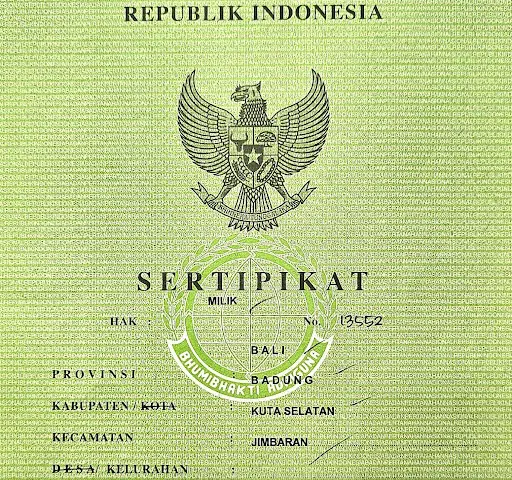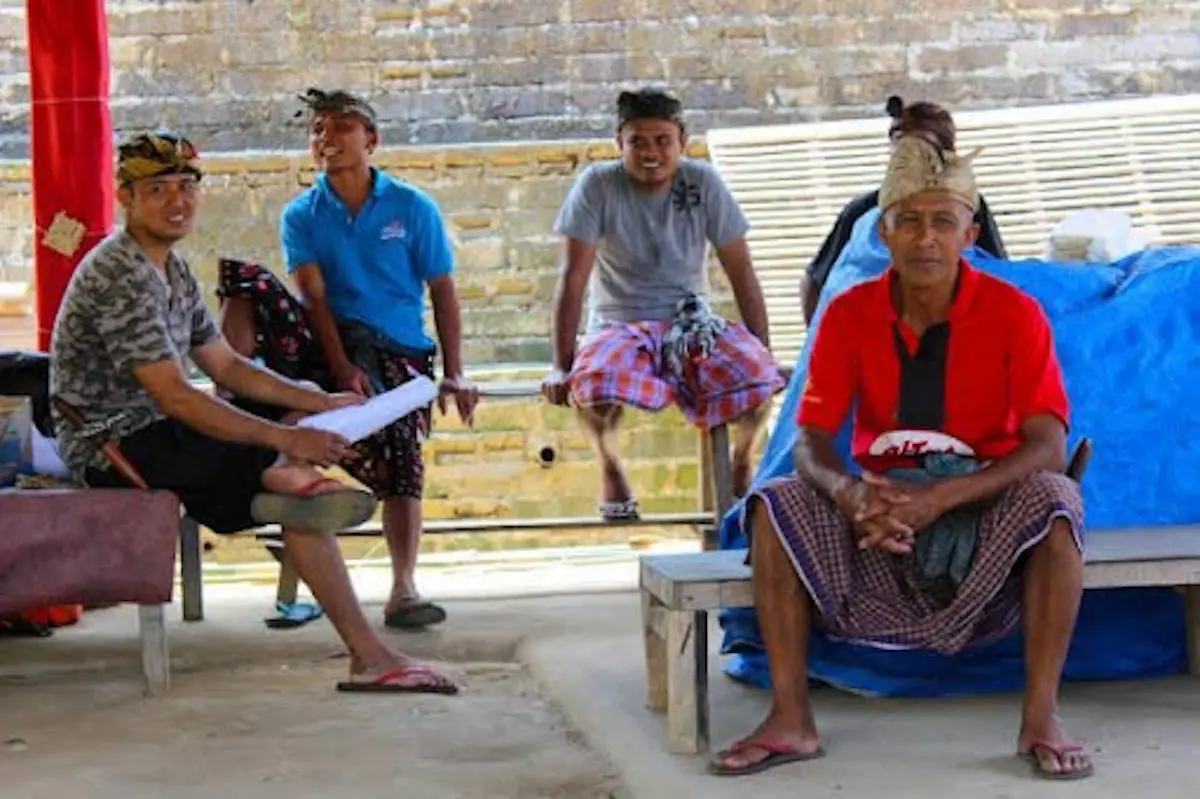Many investors (around 70% according to our statistics) tend to trust developers or landowners in Bali without verifying documents.
This approach can continue, but if it does, based on our estimates, about 50% of investors on the island will partially or completely lose their capital in the next 3-5 years. In the best-case scenario, they will remain in Bali "for the long term," waiting for their investments to appreciate or for annual passive income to increase.. А в хорошем случае, останутся на Бали “в долгую”, ожидая роста стоимости своих инвестиций или роста ежегодного пассивного дохода.
One reason for this situation is purchasing properties above their actual value, which effectively deprives investors of a significant portion of the profit from resale or passive management.
The second reason is excessive trust or a lack of knowledge about their rights during the deal-making process, which leads to a complete loss of control as early as the contract stage.
You can read more about what documents a developer should have and the main investment rules in Bali here - https://bali-legal.com/en/kupit-i-postroit-nedvizhimost-na-bali-inostranczu-en.
The main risk for an investor is the land
The foundation for understanding and verifying the developer or property owner is the land on which the property is located or will be built.

When starting any interaction with a developer, it's essential to request the land certificate.
In the certificate:
Pay attention to the status of the land. For example, the status "HAK MILIK" (ownership) is often indicated. As you may already know from this article - https://bali-legal.com/en/kupit-i-postroit-nedvizhimost-na-bali-inostranczu-en - only Indonesian citizens can hold land under HAK MILIK status. Ideally, you should deal directly with the landowner, but this is rare.
Most often, the land will have the status of HAK MILIK (individual ownership) or HAK GUNA BANGUNAN (HGB - temporary ownership by a company). In the first case, if you are not dealing directly with the landowner, request the legal basis for the transaction from the person you're communicating with. In the second case, ensure that the company transferring the property to you for lease after construction, or an already built property, is listed in the HGB certificate.
If the seller/developer is not listed as the owner in the land certificate, always request the legal basis for the transaction. THIS MUST BE THE “PRIMARY LEASE AGREEMENT” signed between the owner listed in the certificate and the seller/developer.
Most of your transactions will involve a middleman, often in the form of a primary lessee or a new owner whose rights are in the process of being formalized under HGB (who is also the seller/developer).
Checking the Legal Basis and Payment Term of the Agreement
If you have been provided with the land certificate and the "primary lease agreement" between the owner listed in the certificate and the current land lessee, ask for information on the following:
Payment term of the agreement. This is a critical parameter. To legally manage the land, the lessee must pay the entire lease in full. In Bali, it’s quite common for the lessee to sign a contract for only 2-5 years to avoid significant upfront investment in development. This can lead to a situation where, after purchasing a 25-30 year lease, you may not be able to extend it because the "middleman" (developer) might not renew their own lease.
Match between the term of the "primary lease agreement" and the lease term offered to you. Your agreement with the developer cannot extend beyond the time paid for by the developer or the term of the original lease.
Understanding these points and asking the right questions will allow you to gauge the seller’s reaction at this stage. It can also help you spot potential red flags, giving you the opportunity to walk away from dishonest developers. Blatant scammers will often stop responding, while legitimate companies doing real business will be willing to cooperate and provide all the necessary information.
How developers deceive during these stages can be read here - https://bali-legal.com/en/kak-obmanyivayut-developeryi-na-bali-en.
Learn that the developer is OBLIGED to provide you with these documents.
Land Verification
Once you’ve gathered all the necessary documents, understood where your villa is or will be located, who will be responsible for construction, and on what legal grounds, you can proceed with the official land verification process. This process ensures that the land is:
Free of encumbrances (such as debts or legal disputes).
Zoned appropriately for your planned development.
Accurately listed in terms of ownership details.
This verification can be done quickly and legally, ensuring you avoid any unexpected complications down the line.
This procedure is difficult to complete without a notary, and I do not recommend attempting it if you are unfamiliar with the Indonesian language. A detailed description of the process can be found here: https://bali-legal.com/en/proverka-zemli-en We won’t go into detail about it here.
Before continuing with this article, take the time to study the verification process on your own. Without official reports, there are no guarantees regarding the legal validity of your transaction.
Once you receive the official letters from the land committee, as shown in these examples - https://bali-legal.com/en/proverka-zemli-en. You can request a draft of your agreement with the developer/seller.
What Types of Contracts Are Most Common in Bali?
Let’s first look at the types of deals most often offered to investors by developers or property owners on the island:
1 - Investment Agreement for Construction with Subsequent Transfer of Rights to the Investor for a Specific Period.
This contract is used when there is only a real estate project. The developer has already resolved all land ownership issues and now only needs to bring in an investor to start the construction.
Typically, such agreements are not notarized and are even concluded online. Their final registration with a notary occurs only when the investor is in Bali and the property is already physically constructed.
This is not the most reliable arrangement. To ensure maximum protection, the investor can fly to Bali and sign the notarized contract immediately, without waiting for the construction to be completed. Only after that should the first payment be made.
2 - Lease Agreement for a Completed Property with or without Land for a Specified Period
This contract is made when the property is already built and fully ready for sale. Such an agreement must be notarized, and you will definitely need to fly to Bali to sign it.
The schedule and timing of payments are negotiated individually. You are not obligated to pay the entire amount upfront.
Key Points to Check in Contracts
TAX PAYMENT - Who pays the taxes? - The tax for leasing can range from 10% to 21%. Aim for the seller to cover the taxes in full.
Learn more about taxes in Indonesia - https://bali-legal.com/en/nalogi-v-indonezii-en.

BOUNDARY SCHEME - A surveyed plot of land (legally or semi-legally) as an attachment to the contract, indicating clear boundaries of the plot and a building plan. Typically, the developer does not provide such a scheme, relying on the concept of "approximate plot size." In long-term leases, the lack of a clear reference to specific boundaries can become an issue.
BUILDING PLAN - A detailed floor plan of the buildings on the plot as an attachment to the contract, including dimensions of the building. This will help you understand how the final structure looks/will look and the maximum deviations from the plan.
CONTENT OF THE PROPERTY - What is included in the purchased property? A detailed list of equipment and furniture as a separate attachment to the contract, including descriptions, estimated costs, and categories of materials, furniture, and appliances used.
WARRANTIES FOR THE BUILT STRUCTURE - Including who will bear the cost and the timelines for warranty repair services for the structure, interior finishing, furniture, and appliances.
PAYMENT TERMS - The frequency of payments may depend on the stage of work (for the developer) or the payment schedule. Aim for staged payments to reduce the investment risk in construction.
FINANCIAL RISKS - The size and presence of penalties for the seller/developer's breach of contract obligations. The main risks include incomplete construction, delays in construction, warranty violations, and delays in payments by the Client.
LEGAL CONTENT OF THE TRANSACTION - First and foremost, the presence of HGB and SLF certificates. What these are and how to properly formalize construction is described here - https://bali-legal.com/en/kupit-i-postroit-nedvizhimost-na-bali-inostranczu-en.
Each of these points is important. If any point is missing or not clearly defined, you can ask to have them added to the contract or make corrections.
DEVELOPERS OFTEN DO NOT ALLOW ADJUSTMENTS AND RUSH TO MAKE THE FIRST PAYMENT. THIS IS ALSO A SIGNAL ABOUT THE QUALITY OF THE DEVELOPER. THE AVERAGE TRANSACTION PERIOD IN BALI IS 2-3 MONTHS!!!
In cases of incomplete provision of all necessary documents, it is also advisable to include their provision as a mandatory condition for the developer's party to fulfill. Failure to comply with this condition may lead to the termination of the contract and the necessity to return the entire amount already paid by the investor.
If you need assistance with document verification and preparation for the transaction, checking the developer, or any questions related to investing in Bali, CONTACT US via TELEGRAM OR WHATSAPP for quick communication.
Together, let’s make life on the island comfortable and legal!







